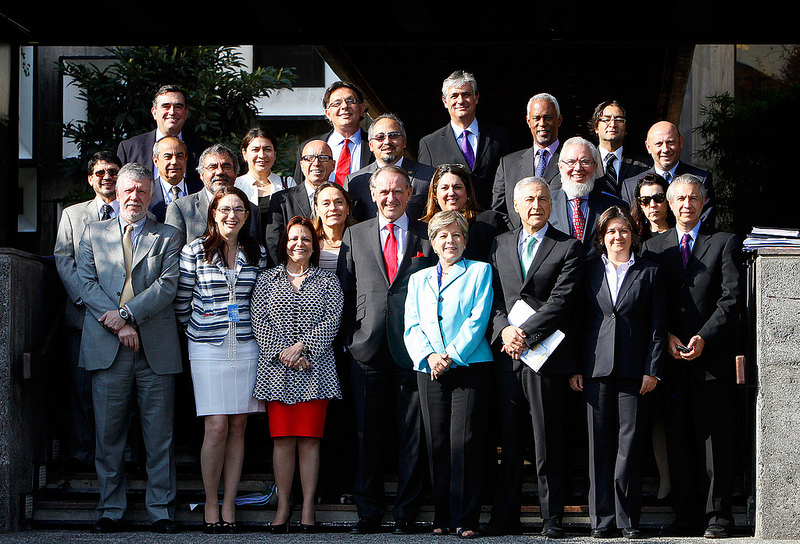UN Agencies Analysed Progress and Challenges in Latin American and Caribbean Countries
Topic(s)
Deputy Secretary-General of the United Nations, Jan Eliasson, led the meeting of the Regional Coordination Mechanism of the UN system.

(25 January 2013) About 20 United Nations agencies represented in Latin America and the Caribbean met on Thursday 24 January at the headquarters of the Economic Commission for Latin America and the Caribbean (ECLAC) in Santiago, Chile, to analyse the regional situation and the UN's post-2015 development agenda.
At the beginning of the meeting of the Latin American and Caribbean Regional Coordination Mechanism, ECLAC Executive Secretary, Alicia Bárcena, welcomed Jan Eliasson, Deputy Secretary-General of the United Nations, who is visiting Chile to take part in the 1st Summit of the Community of Latin American and Caribbean States (CELAC) and the European Union (EU), which will be held this weekend. The ECLAC Deputy Executive Secretary, Antonio Prado, was also present.
According to Jan Eliasson "After several years of economic growth, low inflation, inroads against poverty, job creation and democratic advances, the challenge now for Latin America and the Caribbean is to close social gaps which undermine sustainable development and security. Accelerating your work to achieve the MDGs by the agreed deadline 2015 should be a high priority".
Special guests at the meeting included Carolyn Rodrigues-Birkett, Minister of Foreign Affairs of Guyana and Chair of the Caribbean Development and Cooperation Committee (CDCC), José Miguel Insulza, Secretary-General of the Organization of American States (OAS) and Juan Somavía, former Director-General of the International Labour Organization (ILO). Heraldo Muñoz, United Nations Assistant Secretary-General and Regional Director for Latin America and the Caribbean of the United Nations Development Programme (UNDP), also spoke at the opening.
All agencies in attendance agreed with the development challenges and opportunities facing the region, and the need for a new development paradigm that generates growth with equality and environmental sustainability.
Participants at the meeting referred to democratic consolidation processes under way in Latin American and Caribbean countries, the status of Latin America and the Caribbean as a middle-income region and ongoing inequalities in terms of income distribution, gender and equal access to education, heath and pension services. There was also some discussion of natural resource governance and the region's considerable vulnerability to natural disasters.
According to Jan Eliasson "The key question before us is this: What are we hoping to achieve in the next generation of development goals? Our objective is to eradicate poverty in our lifetime, protect our environment and promote equitable economic and social opportunity for all. Bringing this vision to life is an opportunity to re-think development, draw lessons from our successes to date, and work together to create a just world where all people live with dignity and hope for the future".
Participants at the meeting in Santiago included representatives from the United Nations Development Programme (UNDP), the International Labour Organization (ILO), the Pan-American Health Organization (PAHO), the Food and Agriculture Organization of the United Nations (FAO), the United Nations Educational, Scientific and Cultural Organization (UNESCO), the United Nations Population Fund (UNFPA), the World Food Programme (WFP), the Department of Political Affairs and the United Nations Office for Project Services (UNOPS).
Also in attendance were directors from the Joint United Nations Programme on HIV/AIDS (UNAIDS), the United Nations Environment Programme (UNEP), UN Women, United Nations Children's Fund (UNICEF), UN-HABITAT and the Office of the United Nations High Commissioner for Human Rights (OHCHR).
The agencies agreed to work jointly to present an inter-agency document at the Conference on Sustainable Development in Latin America and the Caribbean: Follow-up to the development agenda beyond 2015 and Rio+20, which is scheduled to be held on 7, 8 and 9 March 2013 in Bogota, Colombia, as well as at other intergovernmental meetings to be held this year.
The document considers various aspects including the region's progress towards the Millennium Development Goals (MDGs), best practices in poverty reduction and the regional proposal for the development agenda beyond 2015 - in order to obtain feedback from countries.
According to Alicia Bárcena: "This region has made a lot of efforts but there remain structural gaps that impede the region's sustainable development. [...] 57 million people were taken out of poverty, buy how do we sustain these results when we have a highly indebted middle class? Employment with rights, employment of quality is the driver for reducing poverty".
Any queries should be sent to the ECLAC Public Information and Web Services Section.
E-mail: prensa@cepal.org; Telephone: (56 2) 2 210 2040.
Follow us on: Twitter, Facebook, Flickr and YouTube.
Country(ies)
- Latin America and the Caribbean
- European Union
Contact
Public Information Unit
- prensa@cepal.org
- (56 2) 2210 2040